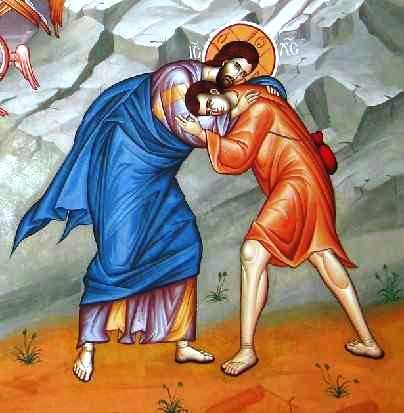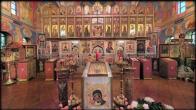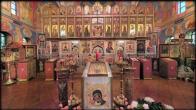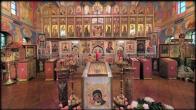You are here
"BY THE WATERS OF BABYLON"

For the Sunday of the Prodigal Son
Two Sundays before the beginning of Great Lent, the parable of the prodigal son (Luke 15: 11-32) is read. That is the reason that particular Sunday came to be known as the ”Sunday of the Prodigal Son.” In order to give Christians a vivid reminder of their withdrawal from their Heavenly Homeland and of their bondage to sin, following the polyeleios Psalms at the Vigil, the Church chants Psalm 136 (KJV Ps. 137), ”By the Waters of Babylon.” It is chanted on each of three Sundays preceding Great Lent.
Babylon was the capital of the empire of the same name, and was the place to which in 597 BC several thousand Israelites were taken from Judea and its contiguous province. Babylon went to war against Judea, and for several centuries, the Judean Kingdom ceased to exist. Seventy years after its defeat, when Judea was being restored, it was under Persian rule; later it came to be ruled by the Greeks and by Rome. Never again was there an independent Kingdom of Judea. It was only in 1948 that the independent State of Israel was created.
With their bondage, the Israelites lost not only their independence, but also their capital, and worst of all, they lost the Temple of which the Lord had spoken to Solomon as being His place of residence. It was only there, in the Temple, that sacrifices were brought, that Holy Days were celebrated, and it was there that Jews from throughout the Mediterranean area assembled for the greatest religious celebrations.
Thus, finding themselves in bondage, they remembered Zion. Zion is the central hill in Jerusalem around which the city was built, and next to which the Temple of Jerusalem was erected.
”Upon the willows in the midst thereof – i.e. already in Babylon – did we hang our instruments. For there, they that had taken us captive asked us for words of song. And they that had led us away asked us for a hymn, saying: Sing us one of the songs of Sion. How shall we sing the Lord's song in a strange land? If I forget thee, O Jerusalem, let my right hand be forgotten. Let my tongue cleave to my throat, if I remember thee not. If I set not Jerusalem above all other, as the head of my joy. Remember O Lord, the sons of Edom, in the day of Jerusalem, who said: lay waste to her, lay waste to her, even to the foundations thereof.”
Edom refers to descendants of Esau, who had sold his birthright to his brother Jacob, who in turn became one of the Patriarchs of God's chosen people. The Edomites were constantly at war with the Judeans, and even participated in the destruction of Jerusalem by the Babylonians; they took joy from the captivity of the people of Israel.
”O daughter of Babylon, thou wretched one, blessed shall he be who shall reward thee wherewith thou hast rewarded us. Blessed shall he be who hall seize and dash thine infants against the rock.” (Psalm 136)
Here is sorrowful poetry about what prisoners, exiled from their homeland and brought to a strange land, are experiencing. This psalm is chanted before Great Lent begins. It does not describe the condition in which a sinner finds himself; rather, it calls him to repentance. This is because often one does not admit his own sins, but comparing himself to others, thinks, I of course am not without sin, am not a saint, but I am no worse than many other people. Here, this person is even worse than I; well, of course, I need to repent, but overall, I have not done anything bad.
In introducing this Psalm into the Vigil before the Sunday of the prodigal son, the Church calls us to this kind of suffering experience. Is our condition not that same departure from God experienced by the sons of Israel? They found themselves far from their homeland, were deprived of their land, their independent government, their culture, and worst of all, deprived of the Temple, of the presence of God, something they had enjoyed during the massive holiday celebrations in Jerusalem.
It is just to such reflection that the Church calls us during the pre-Lenten period: to take a look at our sins and consider: have they not become the reason we are sad, despondent, bereft of joy, feeling that God is not as near as He had been before? After all, it is sin that becomes the barrier between man and God. Psalm 136 tells us about how we come to forget that joyous state that we had experienced when we first came to the Faith, when we were baptized, and had revealed to us the Truths of the Divine Gospel. We come to forget the remarkable moments of the Divine Services when the Lord had touched our hearts. It seems to us that everything has been left in the past, and that now there is only sorrow, despondency, apathy, and laziness....
The Church reminds us that the reasons for this forgetfulness can be like unto those that in days of yore brought the Jews defeat and Babylonian captivity: those reasons are self-assurance, pride, and rejection of God's will. In the Book of Daniel, the Prophet, finding himself captive in Babylon, wrote: ”O Lord, shame of face belongs to us, because for our sins our fathers found themselves transported to a strange land.” It is to such a self-critical appraisal that the Church calls us, so that we might recognize over the course of Great Lent, what is the reason for us to have lost purity, light and joy — all that is given to us by God when we are near Him..
God grant that we might hear the challenge contained in Psalm 136, ”By the Waters of Babylon,” of which the Church reminds its children before Great Lent begins. The Church understands the reference to infants dashed against the rock as opposition to the temptations warring against us, temptations which we should decisively reject. The Psalmist describes our forgetting of a time of grace-filled joy as extreme ungratefulness to God. Merely giving a place in our hearts to this base feeling becomes a source of awful desires. Let my right arm wither, and let me be struck dumb, if I should forget Thee, O Jerusalem, the place of my joy and happiness.
May the Lord bless all of us over the course of Great Lent to feel our sins, as the Israelites in the Babylonian captivity felt the loss of their homeland.
Archpriest Victor Potapov
PARISH LIFE
RECENT VIDEOS
Address of our Cathedral
Subscribe to our mailing list
While all the materials on this site are copyrighted, you may use them freely as long as you treat them
with respect and provide attribution on the Russian Orthodox Cathedral of St.John the Baptist of Washington DC.









